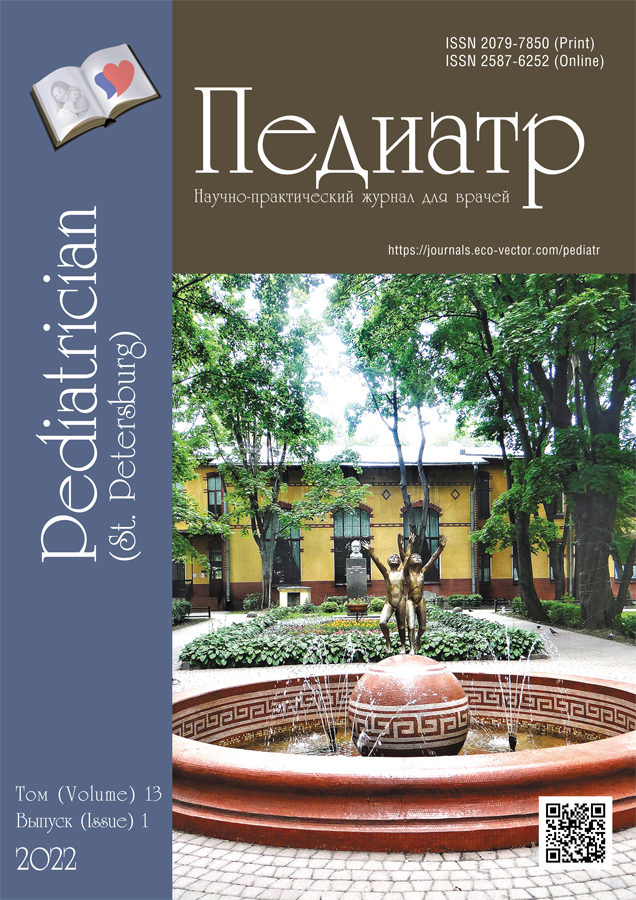Motivation and readiness of pediatric medical university graduates to select medical careers at primary healthcare institutions
- Authors: Sakhno L.V.1, Koltunceva I.V.1, Dubovaia E.G.2, Zemlianykh M.V.1
-
Affiliations:
- St. Petersburg State Pediatric Medical University
- North-Western State Medical University named after I.I. Mechnikov
- Issue: Vol 13, No 1 (2022)
- Pages: 83-92
- Section: Clinical psychology
- URL: https://journals.eco-vector.com/pediatr/article/view/108389
- DOI: https://doi.org/10.17816/PED13183-92
- ID: 108389
Cite item
Abstract
Background. The goal of the study is to assess the readiness of pediatric medical university graduates to work in primary health care institutions and the correlation relationships with their motivations.
Aim. There is a significant staff shortage in Russian healthcare sphere. Directions for solving the problem are indicated, one of them is to increase the attractiveness of the labor function for young specialists with higher and secondary medical education.
Materials and methods. In the 2019/2020 academic year, an anonymous survey of 104 6th year students was conducted at St. Petersburg State Pediatric Medical University, which resulted in a correlation analysis of motivation and willingness to work immediately after graduation from the university as a local pediatrician.
Results. All 104 graduates answered 18 questions on the questionnaire. It was revealed that 77% of students have confidence in their correct choice of the profession of a doctor; 82% of them say that they are attracted by the ability to provide medical care in the profession, 60% – are interested in attractive social status, the ability to earn enough is the attractive feature for 47%. There are several reasons that make the doctor’s profession unattractive. 17% of graduates think that it is working with unhealthy people. Disrespectful attitude of others is significant for 80% of respondents, high legal liability requirements – for 68%, difficulties earning enough – for 62%. Students have also proposed solutions to the problem of staff shortages in primary care. The study revealed that the majority of pediatric university graduates by the time they graduate are confident in the correctness of their chosen profession.
Conclusions. The results of this research can be useful to healthcare organizers to attract graduates of medical universities to work in primary health care, solve the problem of staff shortages and improve the quality of medical care.
Full Text
About the authors
Larisa V. Sakhno
St. Petersburg State Pediatric Medical University
Email: lvs_doc@mail.ru
MD, PhD, Associate Professor of the A.F. Tour Department of Pediatrics
Russian Federation, Saint PetersburgInna V. Koltunceva
St. Petersburg State Pediatric Medical University
Email: koltunceva@yandex.ru
MD, PhD, Associate Professor of the A.F. Tour Department of Pediatrics
Russian Federation, Saint PetersburgElena G. Dubovaia
North-Western State Medical University named after I.I. Mechnikov
Email: elena-dubov@yandex.ru
MD, PhD, Associate Professor of the Department of Therapy, Rheumatology, Expertise on Temporary Disability and Quality of Care named after E.E. Eichwald
Russian Federation, Saint PetersburgMarina V. Zemlianykh
St. Petersburg State Pediatric Medical University
Author for correspondence.
Email: mvz6@mail.ru
MD, PhD, Associate Professor of the Department of Psychosomatics and Psychotherapy
Russian Federation, Saint PetersburgReferences
- Avdeeva TG. Active and interactive teaching techniques in out-patient pediatrics. Smolensk Medical Almanac. 2015;(2):43–46. (In Russ.)
- Agranovich NV, Rubanova NA, Knyshova SA, et al. Difficulties in education and practical training of young doctor under reform of Russian healthcare. Ways to solve the problem and real-life experience. Medical Education and Professional Development. 2019;10(2):77–88. (In Russ.) doi: 10.24411/2220-8453-2019-12004
- Perspektivy dal’neishego razvitiya meditsinskogo prava v Rossiiskoi Federatsii. Rol’ Assotsiatsii meditsinskogo prava Sankt-Peterburga. Meditsina i pravo. Vol. 4. Akulin IM, editor. Moscow: Izdatel’skaya gruppa “Zakon”; 2014. P. 5–23. (In Russ.)
- Artamonova NM, Gostev VV, Kalinina MN, et al. Analiz motivatsionnykh faktorov, opredelivshikh trudoustroistvo vrachei OAO “Meditsina”. Novainfo.ru. 2016;1(52):361–364. (In Russ.)
- Borodulina TV, Noskova MV, Koryakina OV, et al. Analysis of motivation and readiness of graduates for professional activity. Medical Education and Professional Development. 2016;(3):80–86. (In Russ.)
- Buharina TL, Averin VA. Psikhologo-pedagogicheskie aspekty meditsinskogo obrazovaniya. Ekaterinburg: Nauchno-izdatel’skii sovet Ural’skogo otdeleniya Rossiiskoi akademii nauk; 2002. 405 p. (In Russ.)
- Gostimskij AV, Kuznecova YuV, Lisovskij OV. Organization of a simulation study in SPbSPMU. Pediatrician (St. Petersburg). 2015;6(3):118–122. (In Russ.) doi: 10.17816/PED63118-122
- Zorin KV, Toporkov VA, Gurevich KG. Organization of healthcentric and patient-oriented model of education and work of the doctor. Infectious Diseases: News, Views, Education. 2018;7(3):127–132. (In Russ.) doi: 10.24411/2305-3496-2018-13018
- Kloktunova MA. Dynamics of determining motives in choosing the medical profession by medical students. Saratov Journal of Medical Scientific Research. 2013;9(2):333–337. (In Russ.)
- Korsak VO, Terekhova OE, Kapshuk EA, Razdevilova OP. Izuchenie motivatsii professional’nogo vybora vypusknikov meditsinskikh vuzov Rossii. Bulletin of Medical Internet Conferences. 2018;8(1):21–23. (In Russ.)
- Popova LA, Fadeeva IM, Yurlova EM. Choosing a university by first-year students: professional and social factors. Ogarev-online. 2017;(5):10. (In Russ.)
- Surovceva KA, Andronova TA, Bondar’ GD. About motivation the choice of the medical profession. International Journal of Applied and Fundamental Research. 2019;(2):53–56. (In Russ.)
- Timofeev IV. Pravo i meditsina: konstitutsionno-pravovye, organizatsionnye voprosy dostupnosti i kachestva meditsinskoi pomoshchi: uchebnoe posobie dlya vrachei i yuristov. Saint Petersburg: DNK; 2017. 448 p. (In Russ.)
- Neumann M, Bensing J, Merser S, et al. Analyzing the “nature” and “specific effectiveness” of Clinical Empathy: A Theoretical a Theory-Based Research Agenda. Patient Education and Counseling. 2009;74(3): 339–346. doi: 10.1016/j.pec.2008.11.013
- Safi Keykaleh M, Safarpour H, Yousefian S, et al. The Relationship between Nurse’s Job Stress and Patient Safety. Open Access Maced J Med Sci. 2018;6(11): 2228–2232. doi: 10.3889/oamjms.2018.351
Supplementary files











